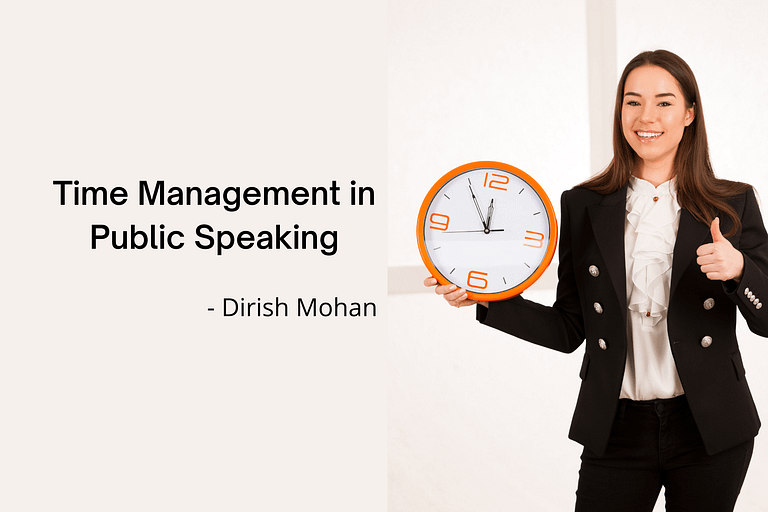Time Management in Public Speaking

I have come across many senior professionals/leaders who are called to say ‘A Few words’ and end up speaking for more than a few minutes. Often, they don’t realize that they are overshooting time. If you wish to be an impactful speaker, you need to stick to time and deliver a speech where the audience are left wanting to hear more from you.
So how do you manage stage time?
As a professional or leader you would be asked to deliver short speeches ( around 5-10 mins), longer speeches (20-30 mins) or presentations ranging from 30 mins to 1 hour. We shall discuss how stage time can be managed in all these scenarios:
Short Speeches: The primary mistake people commit in short speeches is during the scripting stage. In order to make it power-packed, they prepare a 2000-word speech for the allotted 10 mins. This is nothing but a recipe for disaster. Its humanly impossible to deliver a 2000-word speech with appropriate pauses and pacing within 10 minutes. The ideal pace of delivery which people can follow is about 120 words/minute. This is the pace at which the human brain can assimilate data.
The first aspect a speaker needs to gauge is the pace of his/her natural style of delivery. There are speakers who are either too fast or really slow- both don’t work. For a speaker who generally speaks at about 150-160 words a minute, it is important he/she prepares a speech of 1200 words and learns to utilise the allotted 10 minutes. This way, with practice they would be able to reduce their pace of delivery and with time it would become a habit. For speakers who generally speak slowly, it is ideal they prepare a 1000-word speech and deliver it within the allotted time. Speeches delivered at a pace slower than this can become boring.
Longer Speeches (20-30 mins): – There are instances where you maybe speaking for 20-30 minutes without the aid of a presentation. In such cases the ideal method to remember your talk and also manage time is to split the speech into 3-5 main points and deal with each point separately. This way you are creating ‘mini speeches’ and each time you deal with a main point, you exactly know how much to say. It is important to keep a tab of time and vary your pace or time spent on each point accordingly.
Presentations: In a corporate set-up when you are allotted 20 minutes to deliver a presentation, most professionals prepare a 20-25 slide deck and come fully prepared. The result- At the end of 20 minutes, the speaker is stuck at slide 10 and still has a long way to go. More often, we witness speakers spending a lot of time in the initial part of the presentation and later rushing through the remaining parts. The ideal thumb rule to follow is the 1:2 rule, you spend 2 minutes on one slide. So ideally prepare 10 slides for a 20 minute presentation. You could go up to 15 slides if the presentation has ‘lesser important’ slides where the speaker doesn’t invest more than 30 seconds-1 minute. The key to success of such a presentation is to prepare a broad outline about what you would speak when the slide flashes on the screen. This way you would be able to manage time and deliver an impactful presentation.
In the event the presentation is 30 minutes-1 hour, it is important to build it into different sections and summarise the key take-aways at the end of each section. This way the audience would be able to retain the main points and find the presentation insightful.
Stage time is precious. A powerful speaker /presenter is one who learns to respect stage time and creates value within the allotted time. A speaker who sticks to time is always loved and respected by the audience.
Value Your words, while respecting your audience’s time!
